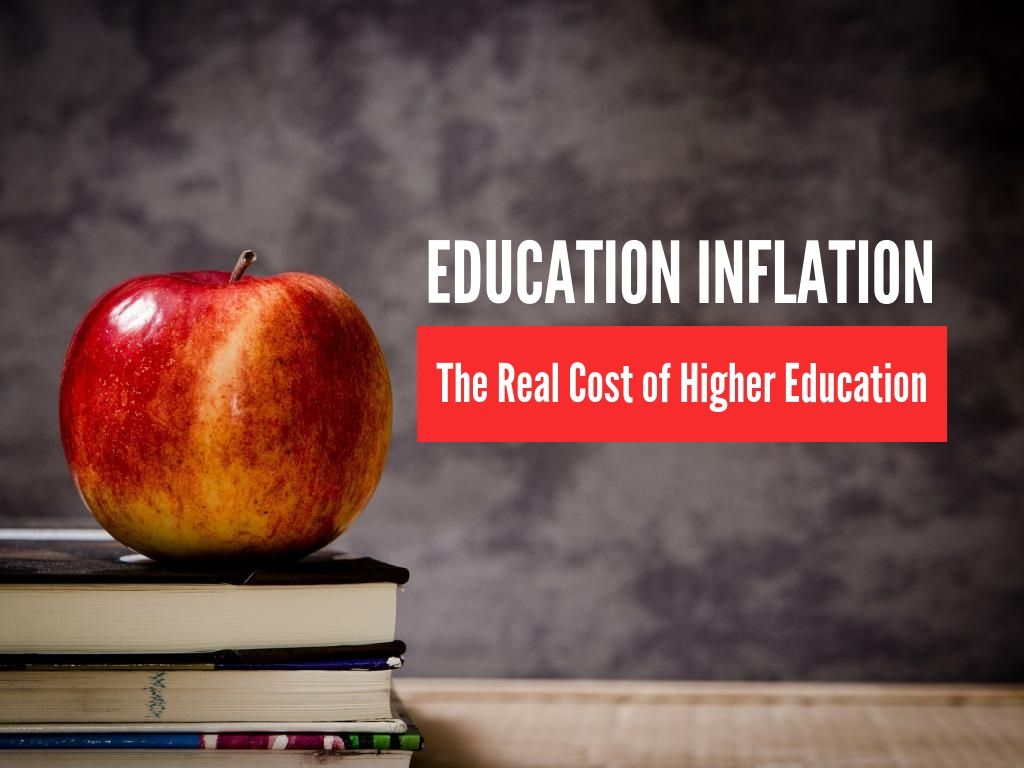Higher education has become imperative these days to land a dream job, to pursue a career in research or to even start on one’s own. Generally, it is considered that higher education makes you a specialist in the specific domain or field. But the burning question these days is ‘Cost of Higher Education’.
 Is it feasible to spend so much on higher education rather than investing it somewhere? For the dedicated lot, higher education becomes must, even if it be costing huge loans or spending a size able chunk of one’s life savings. In the further discussion, I would be discussing in details how realistic is the cost of higher education.
Is it feasible to spend so much on higher education rather than investing it somewhere? For the dedicated lot, higher education becomes must, even if it be costing huge loans or spending a size able chunk of one’s life savings. In the further discussion, I would be discussing in details how realistic is the cost of higher education.
Education Inflation – Rising Cost of Higher Education:
1. Price of colleges growing higher than wages:
The price of college education is increasing more than 6 times faster than the general wages. It means that at some point of time, however high the salary of the family’s earning member be, affording college education would be an option only for the elite. It would not be wrong to say that grades wouldn’t matter so much as the ability to pay for college education if this trend continues.
Some facts to ponder upon…
- Between 1986 and 2006, the average cost to attend a four year University program increased by 2.6%. In the same time period, the wages increased by just 0.3%.
- The cost of higher education has jumped more than 500% since 1985. The consumer price index jumped by 121% since 1985. It implies that the cost of higher education has got approximately 4.5 times more expensive than it was 30 years ago.
2. Increasing cost of rental accomodation for students:
The rising property price is an endemic problem even for the academia. Most often in search of their dream colleges, students need to move out of their town to places where they do not have much idea of the cost of accommodation. They are at often times fooled by landlords and fail to forge rental contracts properly, creating further legal implications. The rising cost of property has only compounded the problem.
When renting accommodation from University or private proves tough, students generally look for sharing accommodation with families. These may at times prove to be a boon where a social cohesion develops and a support is created. But some times, students need to face the problems the family is facing like discords and others, which may affect their studies.
Different accommodation for students:
University Residence Halls:
University Halls are on-campus housing regulated and managed by the specific university. This form of residence is best for first year students as they are new to place and can access all the campus facilities and guidance. A residential advisor looks after the students and is responsible for safety and other social facilities.
The expected cost of living in such places:
- In USA and Canada: $6,000 per semester
- In UK: £200 per week
- In Australia: $135 per week
- In Singapore: SG $1800 per semester
Private Flats:
The estimated cost for renting private accommodation varies in various countries
Expected Cost of Renting:
- In USA and Canada: Around $1200 per month (one BHK)
- In UK: Around £1000 in London and other important cities
- In Australia: $300 – 500 per week (Melbourne and Sydney)
- In Singapore: SG $4000 per month
Private Student Housing:
In this housing you share the flats with other mates. It often kills boredom and creates an all together new experience.
Expected Cost:
- In USA and Canada: $400 – 800 a month
- In UK: £150 – 200 per week
- In Australia: $70 – 250 per week
- In Singapore: SG $1000 per month
Homestay Accommodation:
The cost of staying in home stay accomodation varies and every student has a chance to avail it despite their financial stand.
The problem in availing cheap accommodation is often times evident in academic performance. Over crowded places, discords taking place day in and out and non-conducive roommates may make college education a tough choice for international students.
Increasing Text book costs:
Text book costs have escalated out of control. It has grown more than 600 times in the past 35 years. 2006 was a pivotal year from which textbook costs have been registering more than 3x growth. With such rise in textbook costs, it is doubtful whether students can truly have quality college education in future. Again, education would become more of the privileged rather than for everyone.
Think…
1. What is the criteria for getting admitted in reputed colleges and Post grad studies? Grades
2. What is the criteria for getting good grades?
Quality textbooks and hard labour:
Now if one is left only with hard labour and intellect, can he get grades if he cant afford to buy books? Off course not.
So, the basic right turns out to be a privileged right for students.
So all of government’s vision of a highly educated populace goes into drain. With that quality employable force will also go down. This kind of chain reaction that would affect the entire industries.
It is quite obvious why students tend to procure used textbooks or rent them more than buying new in this academic era.
Tax free Scholarships and Grants:
While many scholarships and grants are there but only the best of the best receives it. Hence majority of us who are mediocre or a little above average get left behind/ The amount being spent on scholarships cant justify the number of students going in for higher education every year.
The loan debt of students:
The students loan debt has reached $1.2 trillion. And an average student has to pay some $35000 more. Now the question is why such thing has happened and how one can overcome this debt?
The cost of education did not just increase by natural rule, but also because of artificial demands being created. The amount a student spends on a college education and the infrastructure that they get to work on is not matching in any proportions sometimes.
Moreover, the education is not really making them employable. Every research work or study doesn’t have high commercial value. Hence we see a select group of students acing the professional life and being able to pay of their debts, while others are staggering far behind.
The situation is quite explosive and if this continues three things are imminent.
- NPAs with financial institutions are bound to increase
- Anxiety and Stress of loans will affect the studies adversely
- State funding and grants are minuscule in overcoming such hurdles and will not be a viable option for students
- Employable resources would go down
- And the already impending danger of education inequality will deepen further.
It is not only societal obligation but a moral obligation, a weight placed on the conscience of society, to consider whether every child was born the same way and should have the same
opportunity.
Author Bio: Gracie Anderson is a sales manager at MyAssignmenthelp . She regularly writes news columns for Education & Students problems. Gracie is also an author of the CPM Homework blog.










































